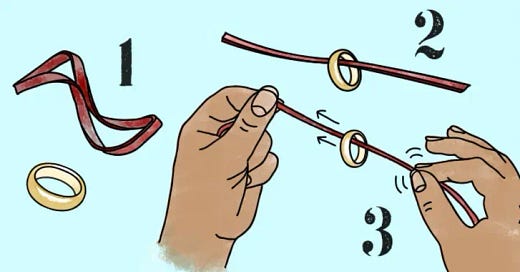End with the punchline
"You shouldn't see the punchline coming, but when you do see it, it makes sense."
BOLO is live and going strong. Check it out now on YouTube and please share and/or leave a comment there:
And here’s a clip:
On with the show…
Happy endings
An obvious but still worthwhile tip for writing jokes: End with the punchline.
I know, seems “no duh.” But when you’re writing/typing out bits (or anything really), it’s easy to fall into the trap of putting the surprising part earlier. But a joke is all leading up to the big bang – and you don’t want to shoot your wad too early. It’s especially true when you’re speaking a joke aloud.
Think like a magician and consider the punchline your voila/abracadabra/ta-da moment. You don’t go ta-da and then start explaining the trick further, y’know?
Jim Steinmeyer compares jokes and tricks in his book Hiding the Elephant.
He writes that the best tricks are a "collection of tiny lies, in words and deeds, that are stacked and arranged ingeniously." Like jokes, tricks should have little plots with a twist at the end that's both implausible and yet logical. You shouldn't see the punchline coming, but when you do see it, it makes sense.
Here’s Josh Spector giving a storytelling example: Don’t lead with the punchline.
But when you write that opening line, don’t lead with the punchline to your story – you want build up to a big reveal at the end.
Doing so draws people in to read your caption and then (assuming you’ve told a decent story), your story will have more impact and generate more engagement.
Here’s an example:
Let’s say I was writing a post about legendary comedian Mel Brooks and wanted to tell a story about how he got his start.
Here’s a poor version of how I could write that caption:
Did you know Mel Brooks decided he wanted to work in Hollywood after his uncle got free tickets to a Broadway show and took Mel to see it?
Interesting tidbit, but poorly presented because it leads with the reveal and doesn’t build any interest or tension.
It’s a story, but a poorly told one.
Now, here’s how I wrote the story when I posted it on X:
In 1935, a poor New York taxi driver offered some Broadway doormen a free ride home.
In gratitude, they gave him free tickets to the play “Anything Goes.”
The driver decided to take his 9-year-old nephew to see the show.
The boy was blown away.
He told his uncle he now knew what he wanted to do with his life…
Work in show business.
And that’s exactly what Mel Brooks did.
You’ll notice I withheld the key bit of information (the “punchline”) until the end to draw people in and for maximum impact.
Totally different approach. Way more interesting (and effective).
Related:






